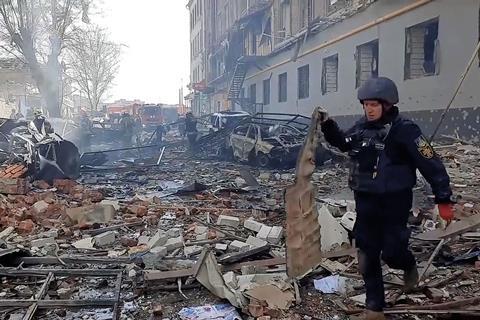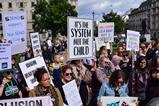Against a backdrop of Ukraine’s cases at the International Court of Justice, is inter-state justice a dusty irrelevance, or a key part of a long game to frustrate aggressors and win the peace?

The United Nations’ highest court, the International Court of Justice, is having a moment right now. Sitting in The Hague, its deliberations on inter-state disputes have typically taken years, and while the world has no higher court, it seems its only enforcement mechanism is the confidence that states will not want to act illegally.
The limits of that sanction in a world where authoritarianism and acts of state aggression have risen in concert are plain. It would be tempting to see the ICJ as an exemplar of a creaking post-war international architecture that has been neither maintained nor replaced.
But the ICJ has advantages. Russia and Israel, for example, recognise the court. While the World Trade Organization’s appellate body has been essentially non-functioning since 2019, and the International Criminal Court struggles with cooperation, membership and jurisdiction, the ICJ has no such problems.
South Africa applied to the ICJ seeking ‘provisional measures’ directing Israel to cease military operations in Gaza – and the court showed a willingness to pick up the pace of its proceedings. The case was brought on 29 December, public hearings were held on 11 and 12 January, and the court issued an order on 26 January.
It is central to the case made by 613 lawyers, academics and former jurists in a letter to the prime minister on 3 April in which they called for a halt to UK arms sales to Israel. Signatories say the order supports their view that there was ‘a plausible risk of genocide in Gaza’.
The ICJ has also been the principal forum to which Ukraine has turned since 2014 to seek determinations against Russia. With Ukraine’s cases being much further advanced than proceedings related to Gaza, they allow us to better assess the court’s current importance in the context of armed conflicts.
Ukraine has substantively succeeded in two cases this year, which have significance in its legal and actual battles with Russia. International firm Covington has acted for Ukraine in its ICJ cases.
Terrorism and racial discrimination
Within the UN system, declarations and ideals are made real through conventions, which is where state commitments are made. Disagreements over those commitments land at the ICJ.
A judgment on 31 January held Russia liable for violations of core obligations under two conventions – the International Convention for the Suppression of the Financing of Terrorism and the International Convention on the Elimination of All Forms of Racial Discrimination.
The judgment confirmed a provisional measures order obtained in 2017, after Russia’s annexation of Ukraine’s Crimea region but before the 2022 invasion.
'The Russian Federation had never been held accountable by any counterparty for its violations of international law'
Jonathan Gimblett, Covington
First, the court declared that Russia violated its obligation under the terrorism financing convention to investigate allegations of terrorism financing by persons in Russia, including by failing to cooperate with Ukraine in the investigation of terrorism financing offences. Ukraine’s case had been that when it faced terror and violence in the Donbas region, from 2014, it asked for Russia’s cooperation, which was refused.
Second, the court found that Russia violated the racial discrimination convention when it significantly reduced the availability of education in the Ukrainian language in Crimea after 2014, producing a disparate adverse impact on the Ukrainian community in Crimea. This amounted to a pattern of racial discrimination and failed to give due regard to the rights and needs of Ukrainian children and their parents.
This is, says Covington partner Jonathan Gimblett, a significant case. ‘The Russian Federation had never been held accountable by any counterparty for its violations of international law,’ he tells the Gazette. ‘This was also the court’s first chance to judge violations under the two conventions.’
Genocide
The second judgment, on 2 February 2024, concerned one of Russia’s stated justifications for its 2022 invasion – that Ukraine had committed genocide. The accusation was a pretext for Russia’s recognition in 2022 of the Donetsk and Luhansk People’s Republics on 21 February, and its full-scale invasion of Ukraine on 24 February.
Thirty-two states intervened in the case in support of Ukraine’s contention that the allegations are false.
This judgment rejected Russia’s attempt to have the case dismissed as outside the court’s jurisdiction or inadmissible in its entirety. The court upheld jurisdiction over Ukraine’s request that the court declare that it is not responsible for committing genocide as alleged by Russia, which the court confirmed was Russia’s stated purpose for its full-scale invasion.
'By rejecting Russia’s effort to shield its false claims from scrutiny, the court has cleared the way for Ukraine to demonstrate on the merits that Russia’s stated justification for its full-scale invasion of Ukraine was baseless'
David Zionts, Covington
It was not quite a clean sweep for Ukraine’s position. The court concluded that it lacked jurisdiction over one of Ukraine’s claims concerning Russia’s abuse of the Genocide Convention. But the judgment means that the court will hear, on the merits, Ukraine’s claim concerning Russia’s justification for aggression – that since 2014, Russia has falsely accused Ukraine of committing genocide in the Donbas region of Ukraine.
Covington partner David Zionts says the judgment’s significance is that, ‘by rejecting Russia’s effort to shield its false claims from scrutiny, the court has cleared the way for Ukraine to demonstrate on the merits that Russia’s stated justification for its full-scale invasion of Ukraine was baseless’.
The case, Gimblett adds, needs to be read in the context of the ICJ’s provisional measures order of 16 March 2022, which ordered Russia to ‘immediately suspend the military operations that it commenced on 24 February 2022 in the territory of Ukraine’. The 2 February judgment confirms the jurisdiction asserted by the court in the provisional measures order.
‘This was Ukraine calling Russia out. This was necessary. We should also note that the provisional measures order remains in force… It’s Russia’s turn to explain itself,’ he says. This is unequivocally ‘an important victory’, Covington said in a press statement.
Enforcement
Critics of the ICJ question the significance of its judgments. Relying on states’ fear of acting in violation of international law can be perceived as wholly inadequate in the current global environment. Where, they ask, are the consequences for acting with impunity?
Part of the long game here involves use of the law and legal process to create a record that reflects reality. In events that overlapped with the early days of the ICJ, the purpose of the Nuremberg trials was not just to secure punishment for the crimes of the second world war, but to create a record.
The record is important here, Gimblett argues. ‘That is why this process is important in the context of Russia’s aggression,’ he says. ‘Faced with a violation, it is creating the record.’
A harder-edged point is that where states take action that is reliant on an established legal point, international law is thereby developed.
‘When the court lacks jurisdiction to address a particular violation of international law, it is all the more important that states – whose practice is what creates international law – are ready to speak up and to act,’ Gimblett notes. ‘The current consideration being given by G7 and EU states to the potential confiscation of immobilised Russian state assets as a countermeasure to Russia’s war of aggression is a great example of the role states can play in encouraging compliance with international law.’
The rulings and even the thinking of the ICJ, like the European Court of Human Rights, can be both persuasive and influential in national courts like those of the UK. The road to legal justice for Ukraine appears long, but ICJ judgments continue to assist its search for justice. But for all its lack of teeth, if the ICJ were a mere dusty irrelevance, would Russia, and indeed Israel, bother with representations at its hearings?
This week the European Commission co-hosts a conference for foreign and justice ministers in The Hague. Titled ‘Restoring Justice for Ukraine’, it focuses on ensuring criminal and civil liability for crimes committed in Ukraine. For Ukraine and its supporters, the law remains a central remedy for the justice sought for Russian aggression.
Ukrainian Bar Association
Ukraine’s lawyers continue to provide a voice on the war with Russia. On 31 March, the Ukrainian Bar Association (UBA) issued an appeal to the international community over Russian-held elections in occupied Ukraine. Polls for Russia’s presidential election were held in occupied Ukraine from 15-17 March.
UBA set out ‘prompt, decisive, practical, and effective actions to bring the war to a definitive end’. Its legal demands include a request for ‘the prosecutor of the International Criminal Court to accelerate the investigation of Russia’s crimes and to apply to the judges of the International Criminal Court for arrest warrants for all members of Russia’s senior political and military leadership involved in the aggression against Ukraine and the genocide of the Ukrainian population’.
It wants to see the establishment of a ‘Special Tribunal for the Crime of Aggression against Ukraine’. UBA also calls on ‘countries with universal jurisdiction – to continue to initiate and conduct investigations and trials of war crimes and crimes against humanity committed by Russia in Ukraine’.
There is a concluding appeal for ‘international and foreign legal associations – to publicly condemn the war and annexation and call on governments to take decisive action’.
This article is now closed for comment.




































1 Reader's comment